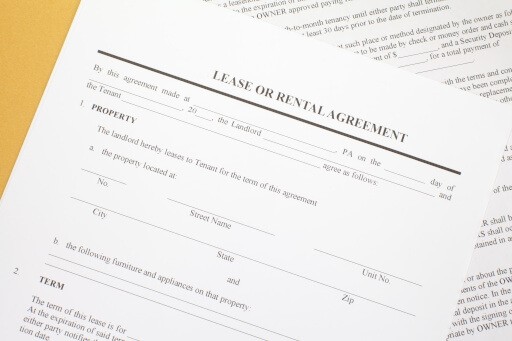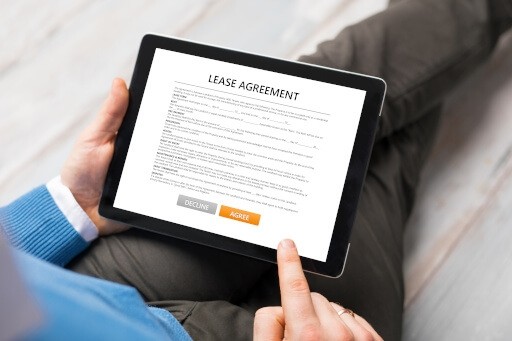As a landlord or property manager, you have the choice of renting your property for a fixed term, such as 12 months, or on a month-to-month basis. What are the advantages and disadvantages of a month-to-month rental lease? It offers flexibility, but this type of agreement also has some drawbacks. In this article, we will provide an in-depth analysis of the pros and cons of month-to-month leases so you can make the best decision for you and your rental home.
What Is a Month-to-Month Lease?
A month-to-month lease is a type of rental agreement that renews each month until either the landlord or tenant decides to end the lease, which is done by providing a 30-day notice to vacate. Renters and landlords can opt for a month-to-month lease either to extend an existing agreement or as the initial arrangement. This versatile option provides flexibility and convenience for both parties involved.
Why Would You Want to Use a Month-to-Month Lease?
A month-to-month lease offers flexibility when it comes to renting out your property. It allows you to have more control over your rental schedule, making it easier to accommodate different tenants throughout the year or rent out your property for a short period. This option is particularly useful when an active fixed-term lease ends, but tenants need additional time to find their next home.
However, it's important to note that month-to-month leases might result in inconsistent rental income. Therefore, it's crucial to be financially prepared, especially in case you experience longer-than-usual vacancy periods.
Pros of Month-to-Month Leases
If you’re considering offering the option of a month-to-month lease to your tenants, it’s important to weigh the pros and cons. The benefits of having month-to-month lease agreements include:
-
Automatic renewals
Unless you or your tenant gives a notice to vacate, a month-to-month tenancy generally renews automatically. This simplifies the process since nothing has to be done unless the landlord or tenant want to make any changes to the terms.
- Flexible end dates
Keep in mind that renters tend to appreciate flexibility of any kind, whether it’s your pet policy or your lease term length options. Because there is no set end date to a month-to-month lease, the lease can end whenever the landlord or tenant wants it to, as long as either party provides proper notice.
- Increased rent price
The price of rent does not change during a fixed-term lease. If you are renting to a tenant month to month, you can change the rent price every month. Landlords typically charge more for month-to-month agreements from the start because they’re not as stable as fixed-term leases. The increased rental income landlords receive from month-to-month leases helps to balance out any risks that may come with this lease length.
- Landlord can terminate lease
When offering a month-to-month tenancy, you generally need to give your tenant a month’s notice to vacate. This varies by state, so you’ll need to look up your state laws to be sure. A month-to-month lease is not only flexible for the tenant, but for the landlord as well. If you no longer wish to have your unit tenanted, you can send a lease termination letter to your tenant. This is especially convenient if you plan to renovate or sell your rental in the future and need it to be vacant within a month’s time.
- Keep good tenants for longer
If you have great tenants who aren’t ready to sign or renew a fixed-term lease, offering the option of a month-to-month agreement is a great way to keep them longer until they either sign another fixed-term lease or move out. This will save you from having a vacant unit and finding a new tenant, at least for a while.
Cons of Month-to-Month Leases
With every pro comes a con, and month-to-month tenancies are no different. Although there are many benefits of offering month-to-month leases to your tenants, there are risks as well, including:
- Lack of stability
Although landlords may appreciate a month-to-month lease’s flexibility in certain scenarios, it can also be a negative. Quality, long-term tenants often pay rent on time, take care of the rental, and pose less of a flight risk, whereas month-to-month leases can end at any time and therefore lack stability.
- Short notice for move outs
If you rent on a month-to-month basis, all your tenant is required to do to end the lease is provide you with proper notice. The length of their notice is typically 30 days, but check your state laws to confirm.
- Short notice to find new tenants
Once you receive notice, you may find yourself scrambling to look for another tenant to avoid a vacancy. If you rush the process without proper tenant screening, your new tenant may not be the best fit for you and your property, and what’s worse than a vacancy is an eviction.
- Risk of unexpected vacancy
Vacancies are the number one way landlords lose money, so if you can’t find a new tenant after your current one has moved out, remember that there are risks to leaving your rental vacant, on top of losing rental income. You don’t want to rush to find a new tenant, but you do want to avoid a vacancy if possible.
The Best Way to Screen Tenants
Before you find a tenant for a month-to-month lease it's essential to screen tenants. Luckily, Apartments.com makes it easy to screen tenants, get the information you need, and find a qualified renter fast. Unlike our competitors, who use various third-party resources to collect information, we partner with TransUnion to provide you with screening reports for evictions, credit, and criminal history. Another feature you’ll find only on Apartments.com is support for co-signers, guarantors, and co-applicants. If you need more information to make a decision, you can request supporting documents from potential tenants directly on our platform. Get all the information you need to find the right tenant quickly and easily.
Month-to-Month Leases vs. Lease Renewals
When a fixed-term lease nears its end date, it’s time for you to send your tenant a lease renewal. If your tenant agrees to the terms, such as a yearly rent increase, then you are both essentially committing to another fixed-term lease. To add “flexible” to your list of qualities as a landlord, consider adding a month-to-month option on your lease renewal. The tenant then either has the choice to renew their fixed-term lease or switch to a month-to-month lease. Although the tenant will still be living in the unit if they choose the month-to-month option, they have opted out of the lease renewal, meaning that a month-to-month lease is not equivalent to a lease renewal. The fixed-term lease was not renewed, and instead, a new month-to-month lease agreement was signed.
Frequently Asked Questions
Even after weighing the pros and cons of month-to-month leases, you may still have a few questions in mind.
Do month-to-month leases automatically renew?
As previously stated, one of the benefits of month-to-month leases is that they are simple. Neither the landlord nor the tenant has to renew the lease every month because it renews automatically.
How soon should tenants send a notice to vacate?
Most states require a minimum of 30 days’ notice for either the tenant or landlord to provide proper notice. The notice period is typically the same for any changes you may want to make to the lease, such as an increase in rent.
Can a month-to-month lease change to a long-term lease?
If your tenant decides to sign a fixed-term lease after renting from you month to month, they can do so (if you’re on board). This will not be considered a lease renewal but an entirely new lease agreement.
As a property owner, offering a month-to-month lease ultimately depends on your specific circumstances and goals. If you prefer steady tenants and guaranteed income, a long-term lease might be the better option. On the other hand, if you're in a high-demand area where you can easily find new renters, or if you like the idea of adjusting rent prices according to market trends, a month-to-month lease could be the perfect fit.











